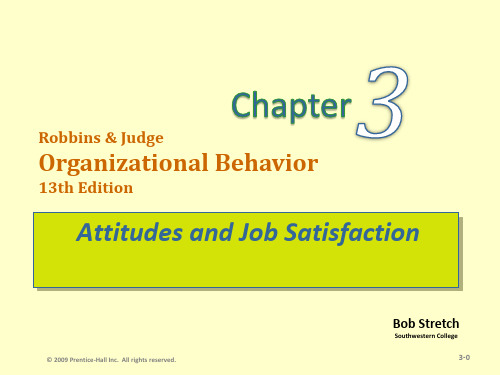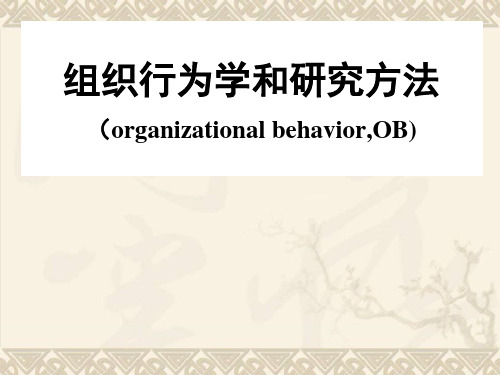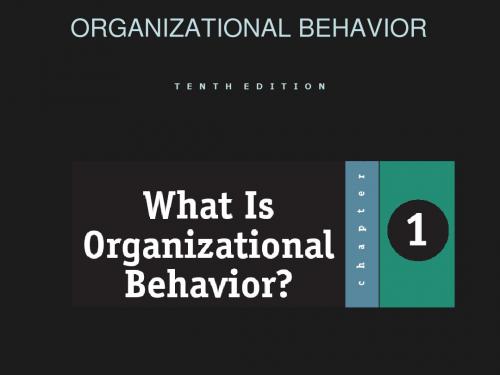Organizational Behavior
Organizational Behavior组织行为学

The phenomena is called Cognitive Dissonance Cognitive Dissonance: Any incompatibility between two or more attitudes or between behavior and attitudes – Individuals seek to reduce this uncomfortable gap, or dissonance, to reach stability and consistency – They do this by altering either the attitudes or the behavior or by developing a rationalization for the discrepancy. [Consistency is achieved by changing the attitudes, modifying the behaviors, or through rationalization]
Robbins & Judge
Organizational Behavior
13th Edition
Attitudes and Job Satisfaction
Bob Stretch
Southwestern College © 2009 Prentice-Hall Inc. All rights reserved.
3-0
Chapter Learning Objectives
After studying this chapter, you should be able to: – Contrast the three components of an attitude. – Summarize the relationship between attitudes and behavior. – Compare and contrast the major job attitudes. – Define job satisfaction and show how it can be measured. – Summarize the main causes of job satisfaction. – Identify four employee responses to dissatisfaction. – Show whether job satisfaction is a relevant concept in countries other than the United States. 3-1
组织行为学和研究方法(organizationalbehavior,OB)

世界100家最 大工业公司 中的位置
3 5 9 1 53
资料来源:赵曙明:《国际企业人力资源管理》P296,1991年7月29日 财富杂志
2020/8/5
13
霍夫斯塔德的文化差异模型
美国学者霍夫斯德(Greet Hotstede)认为,人的个性受到态度、价值观、文 化差异的巨大影响,表现为四个维度:
2020/8/5
14
霍夫斯塔德的文化差异模型
美国 德国 日本 非洲 俄罗斯 中国
2020/8/5
权力 距离
40L 35L 54M
77M 95H 85H
个体 主义
91H
生活 数量
62H
67H 66H
45M 95H
20L 46M
50M 40L 20L 50M
2020/8/5
7
什么是组织行为学(organizational behavior,OB)
组织行为学是研究在组织系统内,个体、群体及结构对 组织内人的行为的影响,以便应用这些知识来改善组 织的有效性。组织行为学是一个研究领域,具有综合 性、应用性的学科特点。
组织行为学研究的重点 组织行为学研究的目的
外国收入 占公司总 收入的%
73.2 58.90 64.70 26.6 54.1 50.00 54.50 40.9
外国净利润 占公司总净 利润的%
97.10 110.30 61.90 69.90 45.10 55.00 68.70 102.10
外国资产占 公司总资产 的%
55.80 48.60 51.10 25.20 44.90 46.20 34.30 28.00
• 组织研究中的权变理论
2020/8/5
11
组织行为学课程教学大纲(双语)

《组织行为学》(双语)课程教学大纲课程中文名称(英文名称):组织行为学(Organizational Behavior)课程代码:B27052课程类别:专业课程课程性质:必修课课程学时: 32学分: 2适用专业:人力资源管理专业先修课程:普通心理学一、课程介绍1。
分别从个体,群体和组织系统三个层面上帮助读者解释、预测和控制组织行为,内容包括:组织行为学导论、态度和工作满意度、情绪与心境、人格与价值观、知觉与个体决策、激励理论及其应用、群体行为的基本原理、工作团队、沟通、领导力、权力与政治、冲突与谈判、结构与组织行为、组织文化、组织变革等部分。
2.组织行为学是人力资源管理专业本科学生必修的专业课程,它的先修课程为普通心理学。
二、课程教学目的和任务本课程教学目的是使学生掌握组织行为学的基本知识与发展规律;指导学生阅读相关组织行为学案例,培养学生以现代组织行为学理论为依据,培养学生在团队建设与管理、人际沟通、领导、组织结构设计、组织文化建设、组织变革与发展、跨文化沟通、学习型组织建设等组织行为学的实务能力。
三、课程学时分配、教学内容与教学基本要求四、教学方法与教学手段1、阅读:本科程要求学生在阅读教材的基础上,泛读规定的参考教材。
老师随堂抽查学生阅读情况.2、听课:本课程要求学生进课堂听讲全部课程,并做好笔记。
听课和笔记情况随时检查,记入平时成绩.3、辅导:要求学生主动学习,随时提出问题,老师随堂辅导。
要求学生与老师建立电话、电子邮箱、QQ、微信联系,交流自学情况。
另外,每学期期末集中大型辅导1次。
五、考核方式和成绩评定方法考核方式:期末闭卷考试成绩评定方法:平时成绩(含考勤、回答问题、作业等)占30%,期末考试成绩占70%六、教材与主要参考书目教材:《Essentials of Organizational Behavior》,Stephen P。
Robbins等,中国人民大学出版社,2011年.参考书目:《组织行为学》,陈春花等,机械工业出版社,2013年。
罗宾斯《组织行为学》-第一章

Managers who promoted faster (were successful) did different things than did effective managers (those who did their jobs well)
Enter Organizational Behavior
Management Functions (cont’d)
Leading
A function that includes motivating employees, directing others, selecting the most effective communication channels, and resolving conflicts.
E X H I B I T 1–1 (cont’d)
Mintzberg’s Managerial Roles (cont’d)
Source: Adapted from The Nature of Managerial Work by H. Mintzberg. Copyright © 1973 by H. Mintzberg. Reprinted by permission of Pearson Education.
Management Functions (cont’d)
Control
Lead Organize Lead
Controlling
Monitoring activities to ensure they are being accomplished as planned and correcting any significant deviations.
E X H I B I T 1–1 (cont’d)
组织行为学名词解释

组织行为学名词解释组织行为学(Organizational Behavior,简称OB)是研究个体、团队和组织在工作环境中的行为和互动的学科。
它关注员工的行为和决策,以及如何管理这些行为以达成组织的目标。
以下针对组织行为学的一些关键概念进行详细解释。
1. 个体行为个体行为是指在组织中个人展示出的行动和决策。
个体行为的研究关注员工的情绪、动机、个性、态度以及他们与工作的认同度等因素。
这种研究有助于了解员工在组织中的表现和如何激励他们提高绩效。
2. 团队效能团队效能是团队成员有效地协同合作以实现共同目标的程度。
团队效能的高低与团队沟通、决策过程、信任、共享目标和角色明确程度等因素密切相关。
有效的团队效能有助于解决问题、增加创新和提高绩效。
3. 组织文化组织文化是指在组织中共享的信念、价值观、行为规范和工作方式。
组织文化对员工的行为和态度产生影响,它可以塑造组织的身份认同、激励员工的工作态度,并影响组织的绩效和适应性。
4. 领导力领导力是指影响和指导员工实现组织目标的能力。
领导力研究着重于领导者的特质、行为和影响力,以及如何培养和提高领导力。
有效的领导力可以激发员工的创造力、建立高绩效的团队和塑造积极的组织文化。
5. 组织变革组织变革是组织在追求适应环境和实现目标时的重大改变。
组织变革包括战略转变、结构重组、文化改变等。
研究组织变革可以帮助管理者理解变革过程中员工的情感反应、应对挑战并确保变革成功。
6. 动机理论动机理论研究个体为何会产生行为并如何维持行为的动力。
经典的动机理论包括马斯洛的需求层次理论、赫茨伯格的双因素理论和期望理论等。
了解员工的动机可以帮助管理者设计适当的激励措施,提高员工的工作满意度和绩效。
7. 决策过程决策过程是指个体或团队在做出选择时的思考和行动过程。
决策过程可以通过理性决策模型、行为决策模型和政治决策模型来解释。
了解决策过程有助于优化组织中的决策效果,提高组织的绩效和创新能力。
组织行为学简介 organizational behaviour

Management Functions (cont’d)
Management Functions (cont’d)
Mintzberg’s Managerial Roles
EXHIBIT
1-1a
Mintzberg’s Managerial Roles (cont’d)
EXHIBIT
1-1b
Mintzberg’s Managerial Roles (cont’d)
7. Explain the need for a contingency approach to the study of OB.
What Managers Do
Managerial Activities • Make decisions • Allocate resources • Direct activities of others to attain goals
4. Networking
• Socializing, politicking, and interacting with others
Allocation of Activities by Time
EXHIBIT
1-2
Enter Organizational Behavior
Contributing Disciplines to the OB Field
5. Identify the contributions made by major behavioral science disciplines to OB.
组织行为学OrganizationalBehavior

组织行为是指各类组织的每位成员 在工作过程中表现出的所有行为。
分析水平的不同 微观组织行为 宏观组织行为
与组织目标的关系 正向组织行为 反向组织行为
组织行为的分类
组织行为管理模式
模式基础 管理导向 员工导向 员工心理结果 员工需要满足 绩效结果
专制模式 权力 权威 服从
依赖老板 生存 最差
监护模式 经济资源
“组织”有两方面的含义
作为实体的组织(Organization) 作为过程的组织(Organizing)
(二) 行为
行为是指人或动物表现的,和生 理、心理活动紧密相联的外显的 运动、动作或活动。
勒温认为,行为是人与环境 相互作用的结果
B = f(P,E)
B表示行为;P表示人;E表示环境。
(三) 组织行为
怨言,但如果你们要求我加班是为了工作以外的
事,我无法作到。第五,请注意以下你说话的语
气。第六,我没猜想或假定,也没这必要。”回 信同时抄送了北京、成都、上海、广州。
课前讨论:
什么样的人必须学习组织行为学? 你心目中的这门课应包括哪些内容?
前言
第一部分 导论 第二部分 个体行为 第三部分 群体行为 第四部分 组织行为
第二阶段的继电器装配室实验表明:影响工 作效率的因素不是物质和金钱,而是社会的 和心理的因素。 第三阶段的面谈实验表明:员工的心理变化 直接影响着工作的热情和投入程度。
第四阶段的绕线机工作室实验表明:工人中 有非正式组织存在。
金钱是刺激工 人的唯一动力
心理与社会因 素是直接动力
传
生产率高低取
生产率高低取
金钱 安全与利益 依赖组织
安全 被动合作
支持模式 领导 支持
OrganizationBehavior组织行为学

Organization BehaviorChapter1anizational behavior (OB):A field of study that investigates the impact that individuals, groups and structure have on behavior within organization, for the purpose of applying such knowledge toward improving an organization’s effectiveness2. Managers doManagement functionPlanningA process that includes defining goals, establishingstrategy(策略), and developing plans to coordinate(调整)activitiesControllingMonitoring activities to ensure they are beingaccomplished as planned and correcting anysignificant deviations(背离).OrganizingDetermining what tasks are to be done, who is todo them, how the tasks are to be grouped, whoreports to whom, and where decisions are to bemade.LeadingA function that includes motivating employees,directing others, selecting the most effectivecommunication channels, and resolving conflictsManagement role: 1) interpersonal(人际角色)Figurehead(头面人物) Leader(领导者) Liaison(联络人)2) informational(信息传递者)Monitor(监控者) Disseminator(传递者) Spokesperson(发言人)3) Decisional(决策角色)Entrepreneur(创业者) Disturbance handler(混乱处理者)Resource allocator(资源分配者) Negotiator(谈判者)Management skills: 1) Technical skillsThe ability to apply specialized knowledge or expertise(专门技术).2) Human skillsThe ability to work with, understand, and motivate other people, bothindividually and in groups.3) Conceptual skillsThe mental ability to analyze and diagnose(诊断) complex situations.3. Effective versus Successful Managerial Activities1) Traditional managementDecision making, planning, and controlling2) CommunicationExchanging routine(例行的) information and processing paperwork3) Human resource managementMotivating, disciplining, managing conflict, staffing(人员指挥), and training4) NetworkingSocializing, politicking(政治活动), and interacting(相互影响) with others4. Challenges and Opportunities for OB1) Responding to GlobalizationIncreased foreign assignmentsWorking with people from different culturesOverseeing movement of jobs to countries with low-cost labor2) Managing Workforce Diversity(差异,多样性)Embracing diversityChanging demographics(人口)Implications for managersRecognizing and responding to differences3) Improving Quality and ProductivityQuality management (QM)Process reengineering4) Responding to the Labor ShortageChanging work force demographicsFewer skilled laborersEarly retirements and older workers5) Improving Customer ServiceIncreased expectation of service qualityCustomer-responsive cultures6) Improving People Skills7) Empowering(授权) People8) Stimulating(刺激) Innovation(改革) and Change9) Coping with “Temporariness(临时性)”10) Working in Networked Organizations11) Helping Employees Balance Work/Life Conflicts12) Improving Ethical(伦理的) Behavior5. Independent and dependent variables1) individual-level variables个体水平变量人们带着不同的特点进入组织,这些特点将影响到他们在工作中的行为。
- 1、下载文档前请自行甄别文档内容的完整性,平台不提供额外的编辑、内容补充、找答案等附加服务。
- 2、"仅部分预览"的文档,不可在线预览部分如存在完整性等问题,可反馈申请退款(可完整预览的文档不适用该条件!)。
- 3、如文档侵犯您的权益,请联系客服反馈,我们会尽快为您处理(人工客服工作时间:9:00-18:30)。
Organizational Behavior
Part1: Introduction to Organizational Behavior
Chapter1:organizational behavior overview Organizational behavior (OB) is a field of study devoted to understanding, explaining, and ultimately improving the attitudes and behaviors of individuals and groups in organizations.
OB source:
1.Industrial and organizational psychology
2. Social psychology
3. Sociology
4. Anthropology
5. Economics
Integrative model of organizational behavior
1.Individual outcomes:
Job performance;Organizational commitment
2.Individual mechanisms:
Job satisfaction; stress; motivation; trust,justice and ethics; Learning and decision making
Individual characteristics:
Personality; cultural values; ability
Group mechanisms:
Teams; leaderships
OB在讲什么?(图p.7)
Building a conceptual argument进行概念性论证
Resource-based view
◆Financial(revenue,equity)resources
◆Physical(buildings,machines,technology)resources
◆Other resources(knowledge,decision-making,ability,culture) What makes a resource valuable?(图p.11)
Rare: resources,people
Inimitable:
1.history-----a collective pool of experience,wisdom,and knowledge that benefits the organization.
2.Numerous small decisions-----people make many small decisions day-in and day-out,week-in and week-out.
3.Socially complex resources-----culture,trust,reputation.
Rule of one-eight
Three different correlation sizes (p.15)
How do we know OB?(p.15)
◆Method of Experience---people hold firmly to some belief
because it is consistent with their own experience and observations.
◆Method of Intuition---people hold firmly to some belief because
it “just stands to reason”--it seems obvious or self-evident.。
